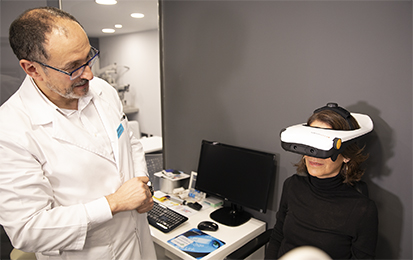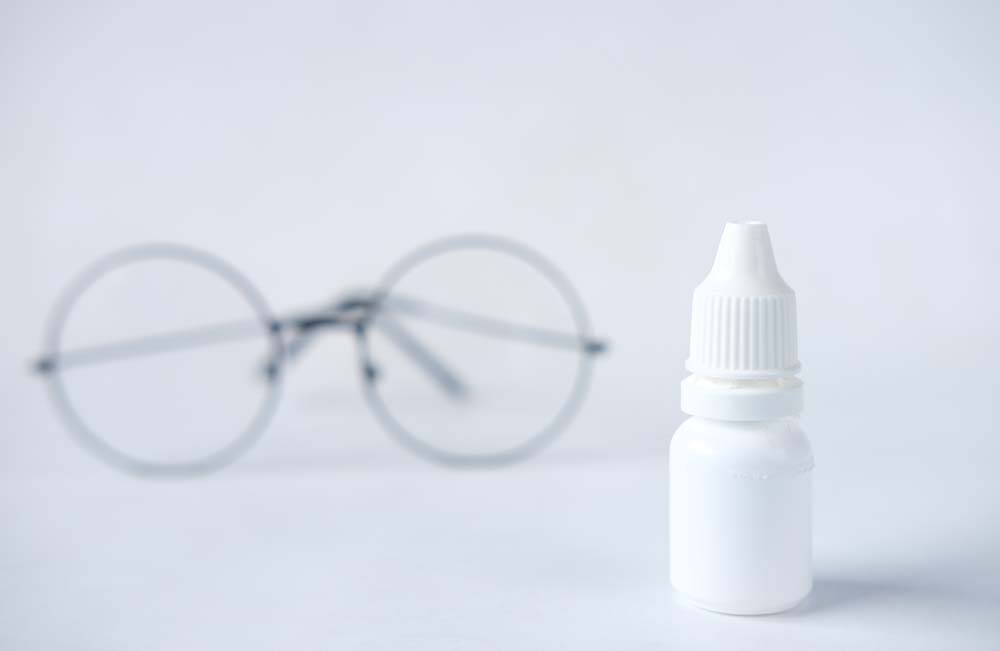.png)
.png)
Transforming the Ophthalmic Surgery Guessing Game.
Picture this… You wake up on the morning of your 40th Birthday. You open your first card but can’t quite make out the writing. Frustrated and fed up of squinting, you reach for your glasses but to no surprise they aren’t where you thought you left them. You’re forced to admit that your eyes just don’t work as well as they used to.
This is a problem that humans have experienced for thousands of years. The medical term is ‘Presbyopia’ which originates from 18th century Greek and roughly translates as ‘old man’s eyes’. It is caused by a loss of elasticity of the eye’s natural lens, making it difficult to adjust from looking at something in the distance to looking at something within arm’s reach. Other common types of vision problems associated with improperly focusing light include near-sightedness (myopia), far-sightedness (hyperopia) and astigmatism.
With people living longer today than ever before, age-related problems like these - as well as cataracts - are causing strain on the NHS and other international healthcare organisations.
As treatment for cataract requires removal of the natural lens and replacement with an artificial lens, it is important for patients and doctors to consider in advance how the patient uses their vision. The same goes for refractive issues which can be treated by multiple surgical procedures, with the best option differing per patient - depending on the severity of their refractive error, daily vision habits and the desired surgical outcome.
I discussed this situation with Dr Balasubramaniam Ilango, who has been practicing as an ophthalmic surgeon for 25 years and has performed over 45,000 cataract/lens implants and 6000 excimer laser vision correction procedures.
Dr Ilango told me how patients’ have become more demanding in the last 20 years because their daily habits have changed, mainly as a result of smart phones. He also said that patients have begun to self-diagnose, meaning that they are less accepting of consultant advice.
Sometimes patients want these perfect outcomes which are medically impossible.
Dr Balasubramaniam Ilango
In most clinics, surgeons are faced with an even bigger issue: the refractive surgery guessing game. That’s because they rely on self-reporting from patients to determine daily focusing habits. This means consultants are reliant on patient transparency and self-awareness to advise on the treatment options right for their lifestyle.
Now technology is revolutionizing refractive surgery, putting an end to this guesswork and helping motivate better patient outcomes.
Swiss start-up, Vivior, are at the heart of this. They’ve created a laser range finder that you attach to a patient’s glasses to monitor what they look at, how they look at it and for how long. This data is a game-changer, helping surgeons make more informed decisions.
There was no tool to tell us objectively about a patient’s lifestyle use of vision, it was a complete guessing game that lacked in scientific evidence. I can’t believe no one questioned this earlier.
Michael Mrochen, Chairman of the Board at Vivior
Vivior’s device only needs three days to collect and record sufficient data, which means it doesn’t disrupt the patient’s lifestyle. It is then taken back to the clinic for the data to be analysed where the correct treatment options can be decided based on accurate patient behaviour.
The new wealth of data and information this technology provides helps build more transparent patient-surgeon relationships. This is especially valuable when compromises need to be made.
.jpg)
Michael Mrochen, Chairman of the Board at Vivior, told me about a conversation that’d he’d had with a surgeon about a case involving technology. He explained that this surgeon’s patient had been asked how much they read, with the answer being ‘not often’. However, on further inspection it was clear that they did a lot of crosswords. Without analysis using the technology, the surgeon would not have known this and gone ahead with a surgery that would have disrupted the patient’s hobby.
That story is something that Dr Ilango could relate to. He added that sometimes his patients don’t understand the science behind treatments and provide information which isn’t an accurate reflection of their lifestyle. This can be dangerous.
Vivior have both a CE mark and FDA clearance for their technology and are commercialising globally. However, there is no competitive product on the market currently, therefore training is crucial to their growth process.
2EyesVision are another exciting company helping surgeons and patients make more informed decisions. Their solution is making a big difference to the lives of people with presbyopia refractive issues.
Our technology reduces any uncertainties for patients and surgeons, as patients can non-invasively experience presbyopic solution prior to surgery.
Susana Marcos, Co-founder of 2EyesVision
There are multiple treatments options for refractive issues, which are best decided on a case-by-case basis. This can make it confusing for patients – especially if they become misinformed by what they read online.

2EyesVision are simplifying the process with their SimVis Gekko. This is a see-through, headmounted, binocular, programmable simulator that provides patients with a real-world experience of presbyopic visual corrections before they have their operation The simulator allows surgeons to evaluate patient performance at different distances and identify the suitability of the patient for multi-focal lenses.
Rather than explaining these complex optics on a confusing sheet of paper or in a video, this gives patients an experience of how their life could be.
Michael Mrochen, Chairman of the Board at Vivior
While this is great for safety and patient outcomes, it can also be used as a commercial tool for clinics. Switching between mono-focal and premium lens options, as well as monovision or modified monovision helps show patients the difference in quality of vision. For a major life decision like this, it’s unlikely that they’re going to want to go for the ‘cheaper’ option.
On their own, these technologies are already pioneering. However, the future of refractive surgery will be shaped by integrating them into the surgical process. Together, they’ll help educate patients on their current habits and give surgeons the best data to provide the best treatment options for patient – depending of their personal lifestyle.
These technologies will now help advance other areas of the ophthalmic industry. Dr Ilango believes that these innovations will become the standard of care over the coming years and help progress lens implant technology. This is because with even greater data on society’s visual behaviour it will be possible for medical device manufacturers to develop more suitable treatment techniques and technology.
Whatever the future holds, it’s certain that there’s a revolution going on in refractive surgery and soon beyond. We are saying goodbye to the guessing game and treatment is getting smarter to provide superior patient outcomes. This is giving people the freedom to live their own lives, without being held back by their vision.
If you’d like to learn more about these exciting companies or would like to tell me about your company, please email me at Becky.Rowlands@medical-cm.com.
For more content like this visit my consultant page.
Recommended.

Breakthroughs in Modern Cataract Surgery.
In 2023, what advancements can be seen across cataract surgery and the wider ophthalmology space? I’ve explored some of the more impressive new tech.

What Does AI Really Mean For Ophthalmology?
AI advancements are leading to huge developments in ophthalmology. What does this mean for clinicians and patients? Click to find out my thoughts.

Glaucoma Companies with 2022 Vision.
I’m always interested in companies focused on innovative devices and products, so was intrigued by these players in the glaucoma market. Click here to find out who.
.jpg)
5 Innovative Surgical and Diagnostic Products Changing the Industry Landscape.
As frequency of eye disease rises with aging populations, these industry innovators are enabling earlier disease detection and creating more efficiency in the process. Click to find out more.
Comments.